Table of Contents
What is Sales Budgeting?
A sales budget is a spreadsheet that documents monthly, quarterly, and annual budgets as well as financial goals, expressed in currency and units of production.
A sales budget is a financial tool of control that a manager uses to plan for profits by giving a detailed breakdown of estimates of sales revenue and selling expenditure. It is the most important element of sales. It is an instrument of planning that shows how to spend money to achieve targeted sales. This is the key budget.
A sales budget is a necessary component in every company’s corporate backbone in order to predict accurate sales forecasts and a particular level of profit. It’s crucial to the business that the sales budget is maintained and accurate because if the information is missing, this negatively affects the rest of the budgeting process.
It states what and how much each salesperson will sell. It also spells out what and how much will be sold to the different classes of customers.
Once the budget is accepted in terms of estimated sales, expenses, and profit figures, the actual results are measured, and compared against the budgeted figures; managers estimate the sales of each product and often make separate forecasts for each class of customer and each territorial division.
Purpose of Budgeting
The primary purpose of having a sales budget is to effectively and accurately determine the number of units that will need to be produced. Units can be used to refer to a physical product or service. The budget is very important for the successful operation of the sales force. It serves several purposes of budgeting as briefed below:
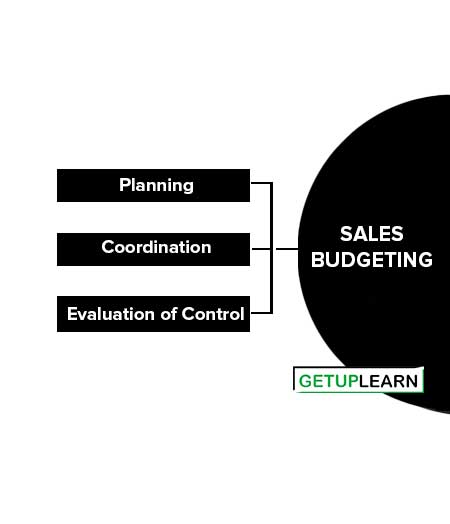
Planning
Corporations and their functional units develop objectives for future periods, and budgets determine how these objectives will be met.
For example, alternative marketing plans, the probable profit from each plan, and the individual budget for each will be considered before management is able to decide on future marketing programs. In order to achieve the goals and objectives of the sales department, a sales manager must outline essential tasks to be performed and compute the estimated costs required for their performance.
A sale budgeting, therefore, helps overall costing and profit planning and provides a guide for action towards achieving the organizational objectives. It is through a detailed breakdown of the sales budget among products, territories, and customers that sales representatives learn what management expects of them.
Coordination
The budget is a major management tool for coordinating the activities of all functional areas and subgroups within the entire organization. For example, sales must be coordinated with production to ensure that enough products are available to meet the demand.
The production manager can use sales forecasts and the sales department’s marketing plans to determine the firm’s revenues and expenses (for example, accounts receivable, inventory, and raw material, labor) and have enough capital to finance all business operations.
Evaluation of Control
Allocation of budgeted funds gives management control over their use. Sales managers estimate their budget needs, are given funds to operate their units, and then are held responsible for reaching their stated goals by using their budgets effectively.
As the sales program is implemented and income and expenses are actually generated, manager access results against the amount budgeted and determine whether they are meeting objectives. The budget also restricts the sales executives from spending more than their share of the funds available for the purchase of revenues.
In sum, the budget helps to prevent expenses from getting out of control. The sales department budgets become tools to evaluate the department’s performance. By meeting the sales and cost goals set forth in the budget, a sales manager gives dependable evidence of his or her success as an executive. The sales budget on adoption becomes the mark against which actual results are compared and performance evaluated.
Advantages of Sales Budget
This is a very important document for a number of reasons. The advantages of sales budget and some of them are as below:
- Part of Master Budget
- Operating Activities
- Helps in Management
- Helps in Improve Results
- Increases and Business Campaigns
- Bases of Sales Budget
- Sales Forecasts and Controls
- Monitor Sales Performance
- Efficiency of Sales Operations
- For Smooth Functioning
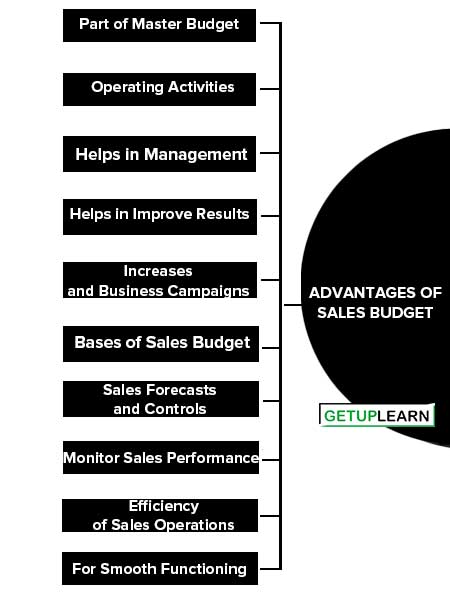
Part of Master Budget
The sales budget is the starting point in preparing the master budget.
Operating Activities
It is the basis of all operating activities in the sales department and in the production and finance areas.
Helps in Management
Having an effective financial plan in place helps management decide on inventory, pricing and allows them to set future goals to promote profitability.
Helps in Improve Results
It is a benchmark for actual results. An effective sales budget is used to compare actual sales volume to revenue for a specific period. The result informs the organization which estimates missed the mark and helps it to improve its accuracy in writing future sales budgets.
Increases and Business Campaigns
It forms the basis for unit price increases and business campaigns. The sales budget can also offer insight as to how to manage price increases, and when to conduct marketing campaigns and promotions. An increase in demand for a product can be an opportunity for a price increase, after management’s review and analysis of the sales budget.
Bases of Sales Budget
It is extremely important to do the best possible job of forecasting since the information in the sales budget is used by most of the other budgets (such as the production budget and the direct materials budget). Thus, if the sales budget is inaccurate, then so too will the other budgets that use it as source material.
Sales Forecasts and Controls
A sales budget helps in attaining sales forecasts and controls the expenditure of resources.
Monitor Sales Performance
It helps to monitor sales performance.
Efficiency of Sales Operations
They also help to maintain and improve the efficiency of sales operations.
For Smooth Functioning
Sales budgets are developed for the smooth functioning of the sales function.
Budget Planning in Sales
The following are the steps to budget planning in sales:
- To create a sales budget, some assumptions have to be made about the future. If the business is running for a few years, the sales and expense forecasts can be made on the performance of previous years. Projections are less predictable when the business is new. In this case, the company has to rely on the business plan and research into the state of the concerned industry to develop a realistic forecast.
- Various details should be included in the budget. Particulars like the pay of all employees (sales staff) and management, advertising and marketing cost, and cost of goods, office overhead, and transportation need to be included when assembling the expenses.
Besides, the costs of any business loans to be taken in the coming year to finance company growth are also included. In order to develop a realistic income side to the budget, how much can be charged for the products or services and how much volume can be realistically sold in the current marketplace should be properly evaluated.
- Budget planning in sales should be performed for immediate use as well as for long-term planning. A one-year plan that drives the marketing projects and advertising campaigns in the short-term can be devised along with creating a longer-term, five-year budget to plan larger expenditures, such as taking on new lines of products, opening another location, going for consolidation, or increasing the profits through staff expansion.
A long-term budget plan helps to prepare for future expenditures and growth while continuing to increase revenues. At the same time, both the short- and long-term budgets should remain flexible enough to respond to changes. Part of the planning should include timelines and benchmarks or baselines upon which the progress can be audited in comparison to the budget and leave enough room to make adjustments as needed.
- It’s usually a wise step to underestimate the income when creating a budget as it is not easy to deal with shortages at the end of the year. It is better to include the financial staff in budget preparations rather than relying only on the estimates of the sales force. Besides, the final budget may be cross-checked by the accountant to ensure that it’s realistic enough.
- Companies typically create an operational plan to increase sales. These activities may need more money than accounted for in previous budgets. Sales managers may need to review this plan with accountants during the budget process to ensure the expenditures are sufficient, in comparison with sales forecasts.
Types of Sales Budget
Sales executives are responsible for formulating three basic budgets. Let’s discuss the types of sales budget:
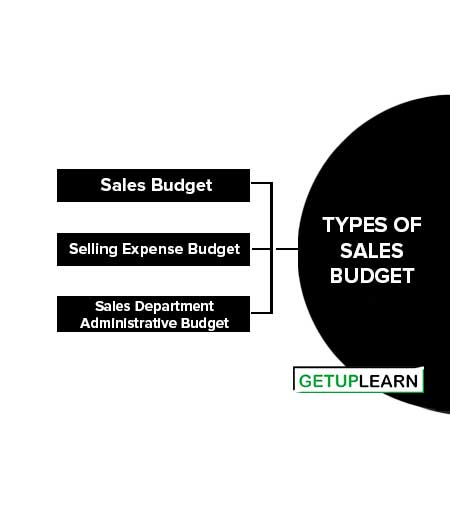
Sales Budget
A sales budget gives a plan showing the expected sales for a specified period in the future. This budget is kept for sales activities and is a detailed plan. It is developed based on expected revenue (sales forecast).
It gives sales according to the geographic location or the product/service offering or salespeople or customers. Generally, the first part of the master budget usually forms the basis for other operational budgets like finance and production.
Selling Expense Budget
Selling expense budgets details the schedule of expenses that may be incurred by the sales department to achieve planned sales. These are the salaries, commissions, and expenses for the sales force. This is not a difficult budget to develop. If the salespeople are on a straight commission, the amount of the revenue allotted for compensation expenses will be determined by the commission rate.
Experience usually indicates how much money must be set aside for expenses. If sales representatives are paid a salary, the process merely requires compiling the amounts, taking into consideration any raises or promotions to be made during the coming period.
Any plans for sales force expansion also should be anticipated in this budget. The selling-expense budget must be closely coordinated with the sales budget. Suppose the sales budget calls for the introduction of a new product line that requires considerable retraining of the sales force and the addition of a new service department.
The expense budgets must reflect those needs. What will it cost to accomplish each line in the sales budget? That is essentially the question the sales manager must answer in preparing the selling-expense budgets that will accompany the sales budget.
Sales Department Administrative Budget
This budget is designed for expenses related to administrative purposes. In addition to having direct control over the management of the sales force, the typical sales executive is also an office manager. Ordinarily, the staff includes sales department secretaries and office workers; the total staff can be large.
There may be several assistant sales managers, sales supervisors, and sales trainers under the sales manager. Managers must make budgetary provisions for their salaries and their staff. They also must budget for such operating expenses as supplies, rent, heat, power and light, office equipment, and general overhead. These costs constitute the administrative budget.
Limitations of Budget
Discussed below are a few limitations of budgets:
- Due to the fact that many components of the master budget rely on the sales budget, the estimated sales volume and price must be forecasted with sufficient care and only reliable forecast techniques should be employed. Otherwise, the master budget will be rendered ineffective for planning and control.
- While having a sales budget is necessary, it also has its own set of limitations.
- It is unable to effectively forecast the future trends of events and thus cannot take this into consideration when making the budget.
- Additionally, preparing a sales budget is very time-consuming, something not all managers will agree with.
Methods of Sales Budgeting
A variety of methods ranging from the Sales Manager’s gut feeling to the application of management science models are used for determining the sales budgets. These methods of sales budgeting can be described as:
- Affordable Method
- Rule of Thumb Method
- Competitor’s Parity Method
- Objective and Task Method
- Zero-Based Budgeting
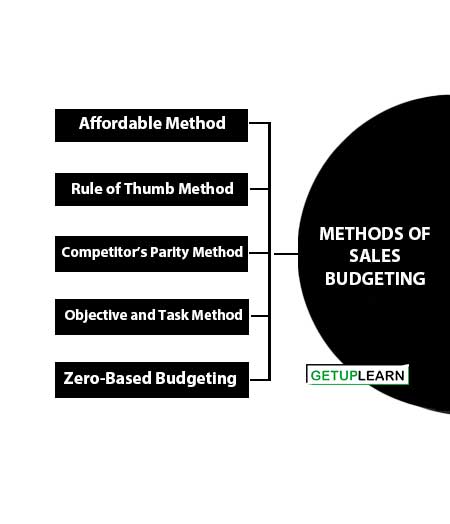
Affordable Method
Many companies set the promotion budget at what they think the companies can afford. This method is adopted by firms dealing in capital industrial goods. Also, companies giving less emphasis on sales and marketing functions or having small size operations make use of this judgmental method.
So, the management develops a sales budget depending on the ability to spend on sales function; such an estimate usually falls short of the sales department’s requirements.
Rule of Thumb Method
Most companies set their sales budget as a specified percentage of sales (either current or anticipated). Mass-selling goods and companies dominated by finance are major users of this method. In this method, the sales revenue is multiplied by a given %; Sales revenue = Past revenue / forecasted figure/ weighted average of both.
Competitor’s Parity Method
This method is adopted by large-sized companies whose products face tough competition and need effective marketing to maintain profits make use of this method.
The knowledge of competitors’ activities and resource allocation is important if an organization wants to pursue this method. It is based on budgeted figures of competitors or industry average and the competitor who is comparable in size and revenue is chosen.
Objective and Task Method
The above methods do not take cognizance of the following organization’s objectives in developing a budget:
- Identify objectives with employees
- Identify tasks for achieving objectives
- Expenditure required
- Form budget
Being a systematic method it helps in the determination of the sales budget by identifying the objective of sales function and then ascertaining the selling and related tasks required to achieve each objective. Later, the cost of each task or activity is calculated to arrive at the total budget. The finalization of the budget may require adjustments both in the objectives as well as in the way the task may be performed.
Zero-Based Budgeting
It is a relatively new approach to budgeting. It involves a process in which the sales budget for each year is initiated from Zero base thus justifying all expenditure and discarding the continuation of conventions and rules of thumb. This method suffers from practical limitations which relate to a very elaborate and time-consuming process required by it.
In practice, companies make use of a combination of the above methods, and depending upon the experience gained, the sales budgeting approach stands refined. The status of the sales and marketing function within the organization determines the extent of sophistication used in the approach to sales budgeting.
Whichever method is chosen, the actual amount budgeted will be based on the organization’s sales forecast, marketing plans, projected profits, top management’s perception of the sales force’s importance in reaching corporate objectives, and the sales manager’s skill in negotiating with superiors. Budgets are often modified several times before the final figures are determined.
Budgeting Process
An effective sales management budget process is critical for achieving sales goals. If the process isn’t designed properly, sales budgeting will only be a futile exercise as opposed to a process that enables the sales team and related departments to achieve their goals. These are the steps of the budgeting process:
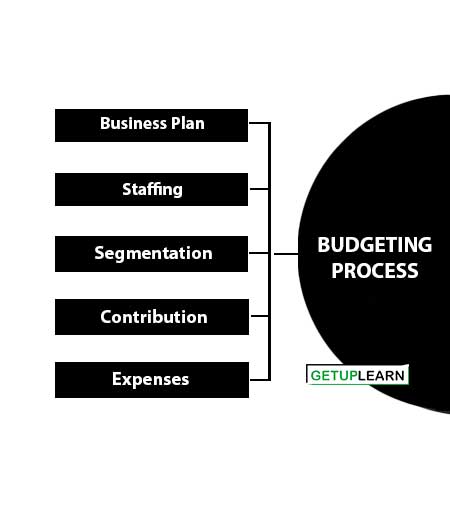
Business Plan
The sales management budget process should not begin until a draft of the business plan and supporting financials has been developed. Without understanding the overall plan for the business and available financial resources to support the plan, a good sales budget will be difficult to develop.
Staffing
A company or sales department should assemble a team to develop the sales management budget. The team should be led by the senior sales management executive from a top-down-direction leading perspective but should also include the lowest level in a sales organization such as a new salesperson.
Those people should be involved who are on the front lines out in the field, calling on prospects, and providing a real-life perspective of the budget creation process.
Segmentation
The team should prepare a sales management budget from multiple perspectives with all the numbers adding up for the same total. For example, the budget should be prepared by product, territory, and salesperson. Each perspective should be validated.
For example, in examining sales by salesperson, the team should examine a review of the past year’s performance by the salesperson to decide how realistic goals are for each individual. When examining budgeted sales by product, product availability should be examined.
Contribution
A sales management budget must also translate the forecasted sales into contributions to company overhead and profits. This helps assure that the right mix of products with the right profit margin is sold.
Expenses
The sales management budget process also includes budgeting expenses. One common approach for budgeting expenses is to review last year’s expenses and adjust those expenses based on the coming year’s forecasted sales and any additional expenses not incurred in the previous year.
Another approach is zero-based budgeting, which does not examine the previous year’s expenses but develops expenses with no assumptions. Such an approach often results in unnecessary expenses being eliminated and expenses being incurred where they can have the biggest impact.
FAQs About the Sales Budgeting
What is the purpose of budgeting?
The purpose of budgeting is Planning, Coordination, and Evaluation of Control .
What are the advantages of sales budget?
These are the following advantages of a sales budget:
1. Part of the Master Budget
2. Operating Activities
3. Helps in Management
4. Helps in Improve Results
5. Increases and Business Campaigns
6. Bases of Sales Budget
7. Sales Forecasts and Controls
8. Monitor Sales Performance
9. The efficiency of Sales Operations
10. For Smooth Functioning.
What are the methods of sales budgeting?
These are some methods of sales budgeting: 1. Affordable Method 2. Rule of Thumb Method 3. Competitor’s Parity Method 4. Objective and Task Method 5. Zero-Based Budgeting.
What is the budgeting process?
These are the steps of the budgeting process: 1. Business Plan 2. Staffing 3. Segmentation 4. Contribution 5. Expenses.
